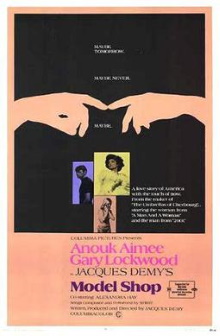
This marks probably the last significant oeuvre from the filmography of Jacques Demy that I’m going to watch and the final part of the trilogy that includes Lola and The Umbrellas of Cherbourg. Yet though Anouk Aimée reprises her role as Lola here, this is an American film with English dialogue and was shot in California. Demy rather incredibly claimed that he was there on vacation and decided to make a film then and there. At the same time, this doesn’t feel American at all and comfortably fits into the broad strokes of the French New Wave movement.
Under threat of being drafted into the Vietnam War, aspiring architect George Matthews drifts aimlessly through life in Los Angeles, indebted and jobless. Meanwhile his live-in girlfriend Gloria who wants to be an actress has become dissatisfied with his lack of ambition. One day while he goes about town to scrounge money from friends to avoid having his car repossessed, he notices an elegant, foreign-looking woman driving a white convertible and decides to follow her. He trails her to a large mansion overlooking a beautiful view of the city. Later in the city, he sees her and again and this time follows her into a tawdry shop. It turns out that she is a model, Lola, and customers pay to take erotic photographs of her wearing lingerie. He books a session with her to try to get to know her but she seems uninterested. He also learns that his draft letter for Vietnam has arrived and he has to report to duty soon.
This isn’t a musical but music still plays a key role here. Real life American band Spirit appear as themselves, chosen by Demy to capture the Los Angeles sound of the era, and their music goes a long way to establish this as a particularly representative film of 1960s USA. In the same vein, the city itself with its streets full of open-topped cars, diners, the flat landscape dotted by nodding donkey oil pumps is a character in the film. It’s fantastic how well a French director can capture the city’s essence so perfectly. Yet the story is still French as we follow George going about almost in real time, ostensibly trying to raise money but actually trying to figure out his next step in life. I love how everything about his girlfriend Gloria is so loudly and distinctively American while Lola is quintessentially French and you can tell the difference just from their body language.
Thematically, Model Shop reinforces the impression of Demy as being an incurable romantic. We see that again and again across all of his films. Lola has divorced from her beloved Michel for whom she had waited for so long and yet George tries to convince her to be open to love again. George has grown listless in his relationship with Gloria and yet one night with Lola is all that is needed to give him the courage to face his fear of his mortality. It’s not terribly original or insightful, which is why Demy is not really considered a French New Wave director even though his wife Agnès Varda definitely is, but you do have to admire his passion. One particularly sombre touch is that a subplot in Lola featured an American sailor involved in the Vietnam War. That was actually Demy’s very first feature film and here, many years and several films later, we see George being apprehensive about being shipped off to Vietnam even though the war seems to be finally winding down. It’s a compact but powerful statement on the public’s increasing weariness of an unpopular war.
While I quite liked this film as I’m a fan of this director, it’s easy to see that this is nowhere good enough to be truly considered a great film so it’s no longer widely watched these days. I do think it’s rather neat that Demy could go to America and make a film like this to capture his own love of the country and still remain every inch a French director.
One thought on “Model Shop (1969)”